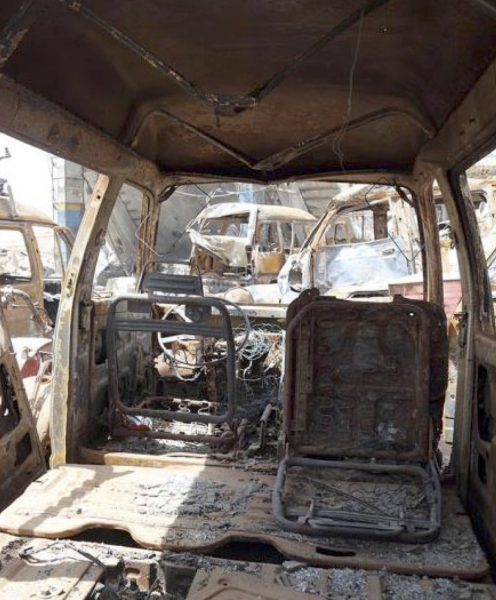
Burned-out cars lined up by the Jarman petrol station, Saada City, Yemen, which was struck in an aerial attack on April 15, 2015. © 2015 Ole Solvang/Human Rights Watch
The UN General Assembly First Committee on Disarmament and International Security will meet between the 8 October add 9 November this year. Governments will discuss a number of critical disarmament topics. The use of explosive weapons in populated areas has been a key cause of harm to civilians in conflicts around the world in 2015. The bombardment of towns and cities has continued to cause widespread civilian casualties, displacement, and destruction of infrastructure. Conflict in Ukraine, Syria, Iraq, Yemen and elsewhere provide clear illustrations of the persistent pattern of harm. Against this background, discussions are now starting towards a political response to this humanitarian problem.
In a briefing paper prepared for UN General Assembly First Committee 2015, INEW urges governments to join efforts to develop a political commitment that can help reduce harm to civilians from the use of explosive weapons in populated areas, and use the opportunity presented by First Committee to:
- Recognise that civilian harm from the use of explosive weapons in populated areas is a humanitarian problem that must be addressed.
- Endorse the UN Secretary-General’s recommendation that the use in densely populated areas of explosive weapons with wide area effects should be avoided.
- Set out national policies and practices related to the use of explosive weapons in populated areas, including in response to the Note Verbale sent by the UN Secretary-General to all states, via their Permanent Representatives to the United Nations in New York.
- Indicate support for the development of an international commitment to reduce harm from the use of explosive weapons, including by stopping the use in populated areas of explosive weapons with wide area effects.
Beyond First Committee:
- States should participate constructively in discussions to develop an international commitment to address this humanitarian priority.
In such an instrument, states should commit to:
- Stop the use in populated areas of explosive weapons that have wide area effects;
- Review national policy and practice and make changes that will strengthen the protection of civilians;
- Support stronger data-gathering on the use and impact of explosive weapons, including age- and sex- disaggregated recording of casualties, and information on disabilities amongst survivors; and
- Recognise the rights of victims and survivors and facilitate assistance.
Read more
Read INEW’s contribution to Reaching Critical Will of WILPF’s First Committee Briefing Book for more background.
